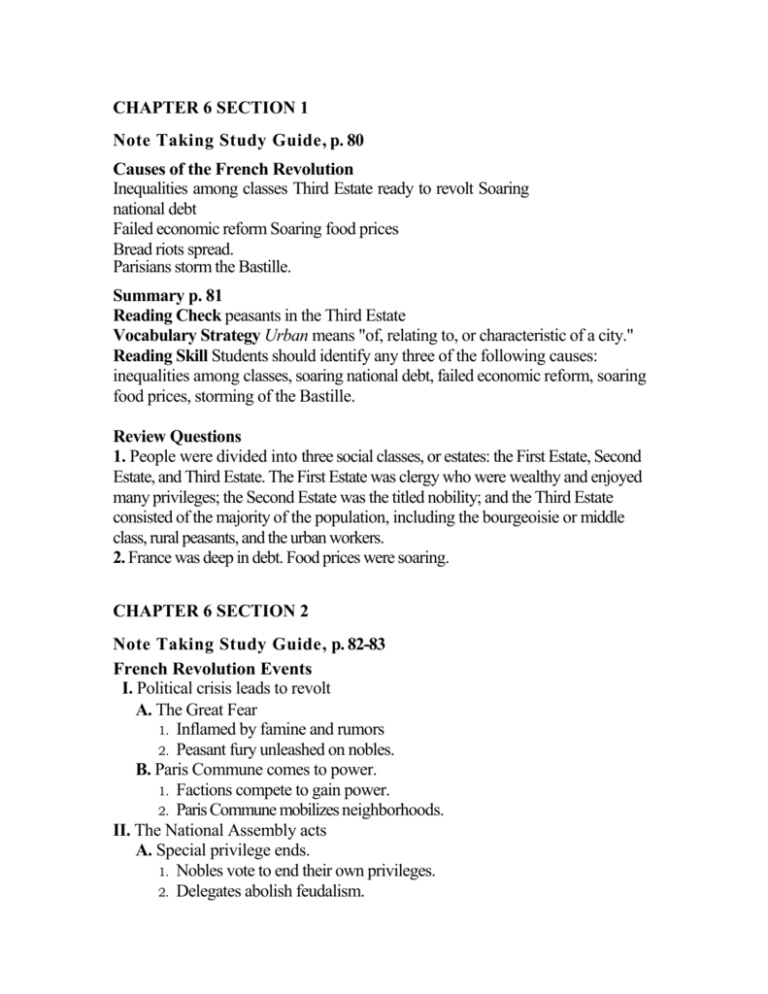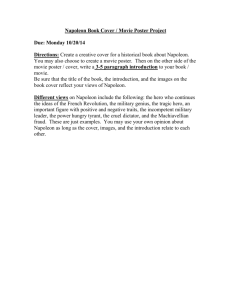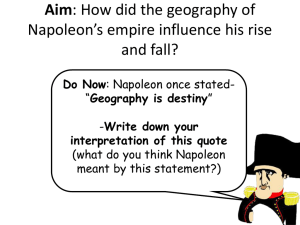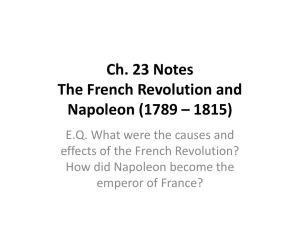CHAPTER 6 SECTION 2 Note Taking Study Guide, p. 82
advertisement

CHAPTER 6 SECTION 1 Note Taking Study Guide, p. 80 Causes of the French Revolution Inequalities among classes Third Estate ready to revolt Soaring national debt Failed economic reform Soaring food prices Bread riots spread. Parisians storm the Bastille. Summary p. 81 Reading Check peasants in the Third Estate Vocabulary Strategy Urban means "of, relating to, or characteristic of a city." Reading Skill Students should identify any three of the following causes: inequalities among classes, soaring national debt, failed economic reform, soaring food prices, storming of the Bastille. Review Questions 1. People were divided into three social classes, or estates: the First Estate, Second Estate, and Third Estate. The First Estate was clergy who were wealthy and enjoyed many privileges; the Second Estate was the titled nobility; and the Third Estate consisted of the majority of the population, including the bourgeoisie or middle class, rural peasants, and the urban workers. 2. France was deep in debt. Food prices were soaring. CHAPTER 6 SECTION 2 Note Taking Study Guide, p. 82-83 French Revolution Events I. Political crisis leads to revolt A. The Great Fear 1. Inflamed by famine and rumors 2. Peasant fury unleashed on nobles. B. Paris Commune comes to power. 1. Factions compete to gain power. 2. Paris Commune mobilizes neighborhoods. II. The National Assembly acts A. Special privilege ends. 1. Nobles vote to end their own privileges. 2. Delegates abolish feudalism. B. Declaration of the Rights of Man 1. Modeled on the American Declaration of Independence 2. Equal rights for women not granted. C. Women march on Versailles. 1. Anger at Marie Antoinette's extravagant lifestyle 2. Demand that the king return to Paris III. The National Assembly presses onward A. The Church is placed under state control. 1. Civil Constitution ends papal authority and dissolves convents and monasteries. 2. Angry reaction by bishops, priests, pope, and French peasants B. The Constitution of 1791 establishes a new government. 1. Replaces absolute monarchy with limited monarchy 2. Reflects Enlightenment goals C. Louis's escape fails. 1. Royal family attempts disguised escape across the border. 2. Louis's escape attempt makes him a traitor to the revolution. IV. Radicals take over A. Rulers fear spread of revolution. 1. European rulers increase border patrols to stop "French plague." 2. Fears fueled by stories from émigrés. B. Threats come from abroad. 1. King of Prussia and emperor of Austria issue the Declaration of Pilnitz. 2. Revolutionaries in France prepare for war. C. Radicals fight for power and declare war. 1. Newly elected Legislative Assembly survives less than a year. 2. Sans-culottes and Jacobins demand a republic. D. The National Assembly declares war on tyranny. 1. Radicals gain upper hand in the Legislative Assembly. 2. Legislative Assembly declares war on Austria, Prussia, and Britain. Summary p. 84 Reading Check They were working-class men and women who pushed the revolution in a more radical direction and demanded a republic. Vocabulary Strategy Proclaimed means "announced officially." Reading Skill It ensured equality before the law for all male citizens and ended Church interference in government. Review Questions 1. It declared that all male citizens were equal before the law; some were upset that it did not include equal rights for women. 2. They denounced it and increased border patrols to stop the spread of the "French plague" of revolution. CHAPTER 6 SECTION 3 Note Taking Study Guide, p. 85 The Revolutionary Period in France Aug. 1792 Mob invades royal palace. Sept. 1792 September massacres take place; National Convention abolishes the monarchy and establishes the French Republic. Jan. 1793 Louis XVI is executed. Sept. 1793 The Reign of Terror begins. July 1794 Robespierre is arrested and executed; The Reign of Terror ends. 1795 Moderates write the Constitution of 1795. Summary p. 86 Reading Check He was a leader of the Committee of Public Safety and one of the chief architects of the Reign of Terror. Vocabulary Strategy Radical means "extreme; departure from the usual or traditional." Reading Skill The radicals called for the election of a new legislative body, the National Convention. This radical body voted to abolish the monarchy and establish the French Republic. Louis XVI and his queen were executed. Review Questions 1. the French Republic; 2. It dislodged the old social order, overthrew the monarchy and established a republic, and brought the Church under state control. CHAPTER 6 SECTION 4 Note Taking Study Guide p. 87) Napoleon Bonaparte Napoleon quickly advances through military ranks. In 1802, Napoleon names himself consul for life. In 1804, Napoleon assumes the title of Emperor of the French. Napoleon consolidates his power by strengthening the central government. Napoleon reforms France and wins support across class lines. From 1804 to 1812, Napoleon creates a vast French empire. In 1812, Napoleon invades Russia. In 1813, a new European alliance defeats Napoleon in the Battle of the Nations at Leipzig. The next year, Napoleon abdicates, or steps down. In March 1815, Napoleon returns to France triumphantly. One hundred days later, British and Prussian forces crush Napoleon completely at the Battle of Waterloo. Napoleon is forced to abdicate and go into exile. On-Level Summary (p. 88) Reading Check a new code of laws that embodied Enlightenment principles Vocabulary Strategy Anticipate means "to foresee or expect." Reading Skill Possible answers: The Impact of Napoleon; Why Napoleon Failed Review Questions 1. All classes supported the reforms. 2. The Russians' scorched-earth policy left the French hungry and cold. Napoleon's armies were forced to retreat through the long winter.








